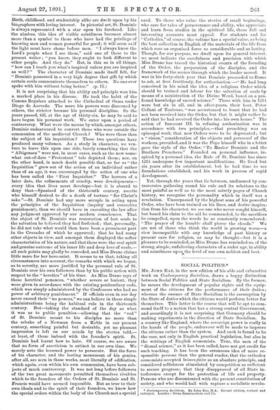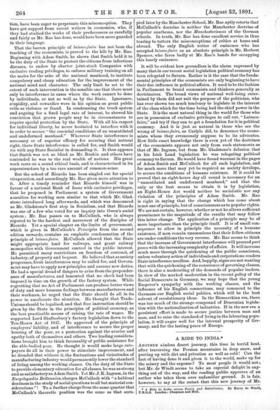SOCIAL POLITICS.*
Ma. JOHN RAE, in the new edition of his able and exhaustive work on Contemporary Socialism, draws a happy distinction between Social Politics and State Socialism. By the former, he means the development of popular rights and the equip- ment of the citizens for the performance of their duties ; whereas the essence of State Socialism is the assumption by the State of duties which the citizens would perform better for themselves. This latter is the course that will be apt to com- mend itself to a nation that has a strong central Government, and accordingly it is not surprising that Germany should be making experiments in the direction of State Socialism. In a country like England, where the sovereign power is really in the hands of the people, endeavour will be made to improve the citizens rather than the system. And such is found to be the case, not only in English practical legislation, but also in the writings of English economists. True, the men of the " dismal science," as it has been called, have not got credit for such teaching. It has been the erroneous idea of more re- sponsible persons than the general reader, that the orthodox economists accepted laissez-faire as an absolute principle, and considered selfishness stimulated by competition as sufficient to secure progress ; that they disapproved of all State in- terference except for the protection of life and property. Persons who are discontented with the present constitution of society, and who would hail with rapture a socialistic revoln-
• Contemporary Socialism. By John Rae, M.A. Second edition, revised and enlarged. London : Swan Sonnenschein and Co.
tion, have been eager to perpetuate this misconception. They have got support from recent writers in economics, who, if they had studied the works of their predecessors as carefully and fairly as Mr. Rae has done, would have been more guarded in their language.
That the barren principle of laissez-faire has not been the teaching of the economists, is proved to the hilt by Mr. Rae. Beginning with Adam Smith, be shows that Smith held it to be the duty of the State to protect the citizens from infectious diseases, to endow by charter joint-stock Companies with exclusive trading privileges, to enforce military training on all the males for the sake of the national manhood, to institute compulsory and cheap education for the improvement of the national mind and character. The only limit he set to the extent of such intervention is the sensible one that there must only be interference in cases where the work cannot be done by individuals, or not so well as by the State. Ignorance, stupidity, and cowardice were in his opinion as great public evils as violence or fraud. In condemning the truck system and arguing for a fixed legal rate of interest, he showed his conviction that grown people may be in circumstances to require special protection by the State. With all his respect for individual liberty, he never hesitated to interfere with it in order to secure "the essential conditions of an unmutilated and undeformed manhood." Wherever State interference is necessary or of superior efficacy for securing that natural right, there State interference is called for, and Smith would vie with any State Socialist in demanding it. It thus appears that Smith was not so blind as Mr. Ruskin and others have contended he was to the real wealth of nations. His great work rests on a sound ethical basis, and is characterised in its superstructure by a too rare amount of common-sense.
But the school of Ricardo has been singled out for special vituperation, and accordingly Mr. Rae gives more attention to it. After a timely reminder that Ricardo himself was in favour of a national Bank of Issue with exclusive privileges, that he proposed in Parliament a system of Government annuities for working men similar to that which Mr. Glad- stone introduced long afterwards, and which was denounced as Mr. Gladstone's first step in Socialism, and that Ricardo was one of a few who voted for an inquiry into Owen's social system ; Mr. Rae passes on to McCulloch, who is always reputed to be the hardest and narrowest of the disciples of Ricardo. Yet a special chapter on the limits of government, which is given in McCulloch's Principles from the second edition onwards, contains an emphatic condemnation of the principle of laissez-faire. McCulloch allowed that the State might appropriate land for railways, and grant railway monopolies with Government control in the public interest. He permitted many restrictions on freedom of contract, of industry, of property and bequest. He believed that as society progresses, fresh interferences may be called for, and Govern- ment may have to apply new principles and assume new duties. He had a special dread of dangers to arise from the preponder- ance of manufactures, and lamented that no check had been imposed in time on the growth of the factory system. While regretting that no Act of Parliament can produce better views of duty and more humane feelings between manufacturers and their workmen, he urged that the State should do all in its power to ameliorate the situation. He thought that Trade- -Unions should be legalised, and that free instruction should be given by the State in the principles of political economy, as the best practicable means of raising the rate of wages. He supported Lord Shaftesbury's factory legislation down to the Ten-Hours Act of 1847. He approved of the principle of employers' liability, and of interference to secure the proper housing of the poor, as a protection against the avarice and apathy both of themselves and others. Two leading considera- tions brought him to think favourably of public assistance for the able-bodied poor. He thought it would make large rate- payers do all in their power to stimulate improvement, and he dreaded that without it, the fluctuations and vicissitudes of manufacturing industry would permanently lower the standard of living among the working classes. On the duty of the State to provide elementary education for all classes, he was as strong and as satisfactory as Adam Smith. Yet Mr. J. K. Ingram, in the Encyclopedia Britannica, charges McCulloch with "a habitual deadness in the study of social questions to all but material con- siderations " ! To a further charge from the same quarter that McCulloch's theoretic position was the same as that own- pied later by the Manchester School, Mr. Rae aptly retorts that McCulloch's doctrine is neither the Manchester doctrine of popular anathema, nor the Manchesterismus of the German schools. In truth, Mr. Rae has done excellent service in thus tearing to tatters the misconceptions of critics at home and abroad. The only English writer of eminence who has accepted laissez-faire as an absolute principle is Mr. Herbert Spencer, who fares badly at Mr. Rae's hands for occupying this lonely eminence.
It will be evident how groundless is the alarm expressed by many that in our recent social legislation political economy has been relegated to Saturn. Rather is it the case that the funda- mental principles of the economists are only beginning to have their due influence in political affairs. It used to be the fashion in Parliament to brand economists and thinkers generally as doctrinaires. The broad views of national well-being enter- tained by them did not suit the purpose of the politician, who has ever shown too much tendency to legislate in the interest of the class which for the time being had the chief power in the State. It is the most natural thing in the world for those who are in possession of exclusive privileges to call out, " Laissez- faire," and try if they can to get a foundation for it in political economy. And it is just as natural in those who see the wrong of laissez-faire, as Carlyle did, to denounce the econo- mists whom they erroneously suppose to be its advocates. How little exact knowledge there is even yet of the doctrines of the economists appears not only from such statements as that of Mr. Ingram, but from Mr. Gladstone's delusion that in his Irish Land legislation he was relegating political economy to Saturn. He would have found warrant in the pages of Adam Smith and McCulloch for all such legislation, and for much more that may yet be required as society develops,. to secure the conditions of humane existence. If it could be. proved that an eight-hours day all round is necessary for an " unmutilated and undeformed manhood," and that the only or the best means to obtain it is by legislation,. an Eight-Hours Act would neither be socialistic nor any violation of the principles of Adam Smith. Mr. Rae is right in saying that the change which has come about is not one of principle, but of consciousness as to popular rights. We are not certain, however, whether or not he allows sufficient prominence to the magnitude of the results that may follow this latter change. The application of a principle may be of more importance than the principle itself. It is of small con- sequence to allow in principle the necessity of a humane existence, if men remain unconscious that their fellow-citizens are under conditions the very reverse. Mr. Rae seems to think that the increase of Government interference will proceed pari passu with the increasing complexity of affairs. It will increase much more through the quickening of the public conscience, unless voluntary action of individuals and corporations renders State interference needless. And, happily, signs are not wanting that with the quickening of the conscience of governing classes, there is also a moderating of the demands of popular leaders. In view of the marked moderation in the recent policy of the Social Democrats in Germany, we may hope that the young Emperor's sympathy with the working classes, and the influence of his English connections, may commend to the Germans our English social politics, which will be the best solvent of revolutionary ideas. In the Bismarckian era, there was too much of the strange compound of Draconian legisla- tion with the nationalisation of industries. If in the new era a persistent effort is made to secure justice between man and man, and to raise the standard of living in the labouring popu. lation, it will augur well for the internal prosperity of Ger- many, and for the lasting peace of Europe.



































 Previous page
Previous page